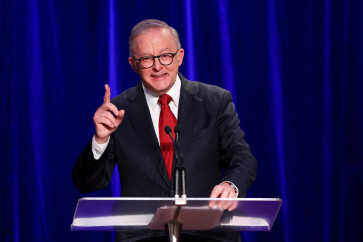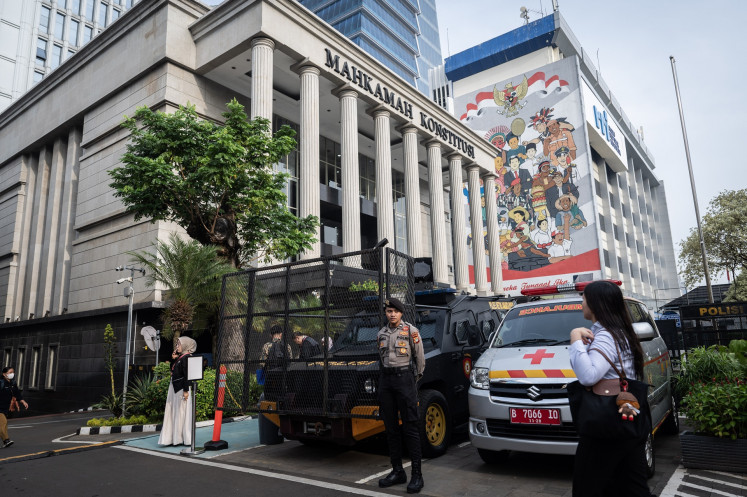RI may relax 2014 ore export ban, with a catch
The government plans to loosen its 2014 ban on exports of unprocessed mineral ore following its recent policy to get rid of export quotas to halt the widening trade deficit
Change text size
Gift Premium Articles
to Anyone

T
he government plans to loosen its 2014 ban on exports of unprocessed mineral ore following its recent policy to get rid of export quotas to halt the widening trade deficit.
Industry Minister MS Hidayat said mining firms that had launched smelting plant projects may be permitted to export unrefined minerals next year ' but only under certain conditions.
'As the miners carry on the construction of their smelting plants, they will be allowed to export [unprocessed mineral ore], with the volume and export taxes to be decided later,' he told reporters in Jakarta on Wednesday.
Progressive export taxes, he said, would still be imposed on unprocessed mineral ore, although miners whose smelters were being constructed may be allowed to export larger volumes.
Separately, the Energy and Mineral Resources Ministry's minerals and coal director general, Thamrin Sihite, said the government might increase the export tax ' whether progressive or not ' for unprocessed mineral ore next year as a means to avoid overexploitation.
But mining firms should at least launch the ground-breaking stage for their smelting plants if they wanted to obtain exemptions next year, he said.
'It will be applied to those companies who have yet to build smelting plants,' Thamrin said.
Under the 2009 Mining Law, miners operating in Indonesia must process their ore domestically starting in 2014, after which time they will no longer be allowed to export raw mineral ore.
The government began imposing export restrictions last year to prevent overexploitation ahead of the export ban. In addition, miners are subject to a 20 percent export tax.
According to Hidayat, the moves so far have generated positive results, with at least six firms already building refineries and smelters to process several kinds of ore, such as iron ore, nickel and bauxite, ahead of the export ban next year.
However, the government recently launched a package of economic stimulus measures, including removing export quotas for mineral commodities for the rest of this year, in order to overcome the current account deficit and restore the stability of the weakening rupiah.
Echoing Hidayat's statement, Energy and Mineral Resources Minister Jero Wacik said the current relaxation for mining companies may be extended into next year.
'Those mining companies with smelters under construction will certainly be in line for incentives,' he said.
The government would evaluate economic growth at the end of this year to make a final decision on the relaxation of the 2014 ban on unprocessed mineral exports, Jero told reporters, adding that the proposal would be discussed with lawmakers.
Mining giants operating in the country, namely Freeport Indonesia and Newmont Nusa Tenggara, have expressed their opposition to the plan, arguing that building smelting plants here 'was not economically feasible'.
But Freeport recently announced that it would supply copper concentrates to two local smelting plants, scheduled to begin production in 2017, in a bid to comply with restrictions on unprocessed ore exports.
Hidayat reasserted that large miners such as Newmont and Freeport would not be given any opt-out from the unprocessed mineral export ban ' which will become effective next year ' adding, therefore, that they should start to either build their own smelters or supply local ones.
The latest change to the government's plan ahead of the 2014 full ban on metal ore exports is liable to irritate industry players that are critical of the government's ever-changing policies.
Syahrir Abubakar, executive director of the Indonesian Mining Association (IMA), said separately that he was 'tired' of commenting on the government's inconsistent policies from time to time.
'I will express my opinions later on if and when these [latest] changes become official,' he said in a text message.
Legal uncertainty in the mining sector has left Indonesia dubbed 'the worst' among the 10 least-attractive countries for the mining industry, based on a survey by the Canadian Fraser Institute in 2012.
Overall, Indonesia was ranked bottom out of 96 countries reviewed by analysts from the Vancouver-based think-tank, a significant fall from being ranked 85 out of 93 countries surveyed in 2011.









